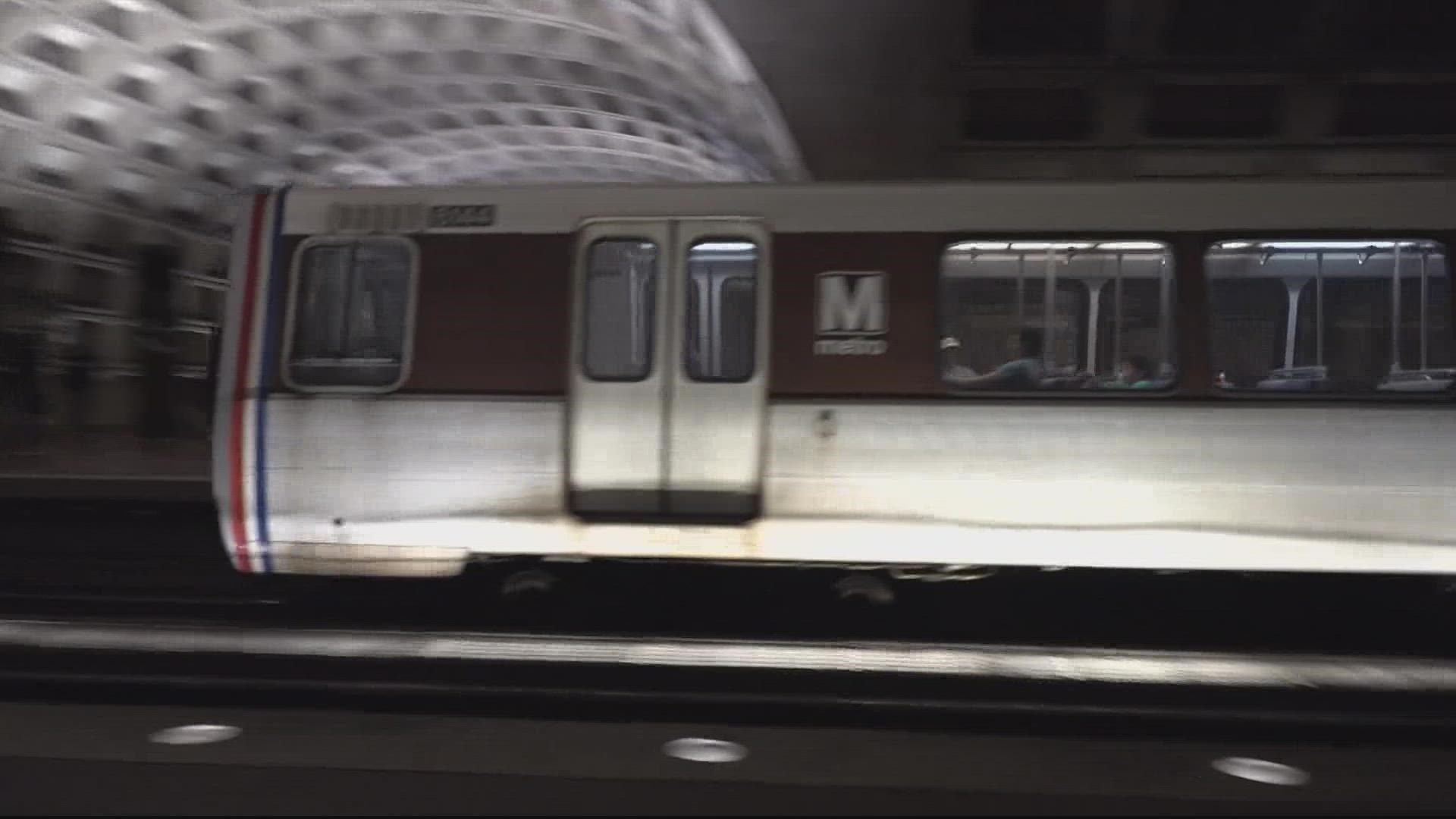WASHINGTON — The Washington Metropolitan Area Transportation Authority (WMATA) announced Sunday that nearly half of the system's 500 rail train operators have lapsed recertification.
In a release, WMATA said, "In consultation with the Board of Directors, Metro management is taking immediate corrective action to remove from service 72 train operators who became out of compliance prior to May 2021."
WMATA went on to say that "temporary service reductions will start Monday which will result in a reduction in Green and Yellow line service from every 15 minutes to every 20 minutes due to the operator shortage."
A spokesman for the Washington Metrorail Safety Commission said the agency has been trying to call Metro's attention to the operators' lapsed certification for weeks. Max Smith says it's another example of continuing issues with the safety culture at Metro.
"Elements of Metrorail have a culture that accepts noncompliance with written rules and procedures," he said. "This is not the operators' fault at all. This is the managers' responsibility to make sure (recertification) happens."
Smith said the recertification issue was not an imminent safety hazard, but he says lack of new training can be a problem. He said the operator on the smoky train where rider Carol Glover asphyxiated was behind on his training on the ventilation system.
The operator shortage means that there will not be extra trains available to relieve crowding, support special events or replace out-of-service trains. The service impacts are expected to continue until the end of May.
"I don't need delays. I need to be on time. I've got to go pick up my grandson," said Don Frahler, a harried passenger boarding at the L'Enfant Metro Station.
"I do feel safe riding Metro still. But I do want our people to get updated," said Aaron March, another passenger.
According to the news release, the Washington Metrorail Safety Commission (WMSC) identified the lapses in recertification in a recent review, which prompted WMATA Executive Vice President and Chief Safety Officer Theresa Impastato to further investigate the issue.
WMATA Board Chair Paul Smedberg said in a statement, “The Board finds this unacceptable and extremely disappointing. We support Metro management’s decision to immediately remove from service operators who became out of compliance more than a year ago as a first step. The Board directed Metro management to provide a full accounting of how and why this occurred and develop a plan to ensure it is remedied as fast as possible.”
According to Smedberg, WMATA's board is concerned about the effect the operator shortage will have on customers.
“However, the Board made it clear safety is the top priority and while Metro has made strides in recent years, this issue demonstrates that more work must be done to ensure an organizational-wide safety culture,” Smedberg said.
In its release, WMATA noted that recertification is important because it gives every train operator time to refresh on the rules, reinforce their knowledge, and benefit from evaluation. The process to recertify more than 250 rail operators will take an estimated two to three months, WMATA says.
According to WMATA, recertification includes classroom instruction and supervised testing in the rail yards as well as on the mainline tracks.
In its release, WMATA gave did not explain why so many train operators had not been recertified.
WMATA noted that because of the lapse in recertification for train operators Metro’s safety department is now reviewing the refresher training of more than 2,500 bus operators, which follows a different process than rail.
“Our bus operators must carry a valid commercial driver’s license, as well as take two-day refresher classes,” Chief Operating Officer Joe Leader said in a statement. “We are identifying bus operators who have lapsed refresher training and will take steps to ensure compliance with Metro’s rules.”
WMATA did not address how many Metrobus drivers might not currently be in compliance with those rules.
Pattern of Metro's declining service amid an uptick in riders
The lack of recertification for train operators is another black eye for the transit system which was forced to pull all of its 7000-series Metro cars out of service after a derailment on the Blue Line last October. Problems with wheels on the 7000 Series cars have yet to be fully resolved, but officials are hoping they'll make a return in the summer. The 7000 series cars make up 60% of Metro's rail fleet.
The train operator recertification problem comes shortly after WMATA announced that ridership was rebounding on both Metrorail and Metrobus.
WMATA noted that ridership was outpacing projections for the first three quarters of fiscal year 2022 by nearly 40%.
WMATA cited higher gas prices, the return of large-scale events and increasing tourism following the pandemic as the reasons for the increase in ridership.
Earlier this week, WMATA announced Randy Clarke as its new General Manager and CEO. Clarke is currently the president and CEO of Capital Metro (CapMetro) in Austin, Texas. Clarke will succeed current WMATA General Manager and CEO Paul Wiedefeld who is retiring at the end of June after six years of leading the transit agency.

